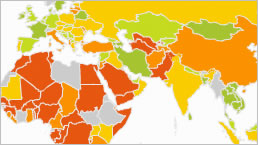11/22/2013 - 6:29 pm
The GPFI held its first forum in Riviera Maya, Mexico, on 1 October 2011. The meeting offered opportunity for stakeholders to exchange ideas on the challenges and opportunities confronted by policy makers in making financial inclusion a reality in their countries, as well as part of a broader global development agenda. It also foreshadowed the kind of commitment to the financial inclusion agenda that is anticipated from Mexico as it prepares to take over the Presidency of the G20 following the Cannes Summit in November 2011.
This was the first meeting of the GPFI since its launch in Seoul in December 2010, and it included GPFI Co-Chairs Mexico, France, and Korea, Her Royal Highness Princess Máxima, the UN Secretary General’s Special Advocate for Inclusive Finance for Development (UNSGSA), who in June 2011 also became Honorary Patron of the GPFI, over 80 participants from G20 member countries and non-G20 member countries, invited financial inclusion advocates, as well as GPFI Implementing Partners AFI, CGAP and IFC.
President Felipe Calderón of Mexico opened the forum with a powerful statement of Mexico’s commitment to financial inclusion as a key pillar for development. In his opening speech, Calderón announced the launch of Mexico’s groundbreaking National Council on Financial Inclusion (NCFI), a body that for the first time brings together all the different Mexican public authorities with an interest in financial inclusion to work towards a coordinated and mutually agreed policy agenda.
One important outcome of the discussions was the affirmation forum participants that while financial inclusion is an important opportunity (linked to other timely development objectives such as job creation), financial exclusion is a risk for financial stability.
In the wake of the global financial crisis, policy makers in developed economies are inevitably focused on stabilizing their economies and financial systems, while policy makers in developing economies that weathered the crisis better are more likely to be invested in financial inclusion as an important element in their country’s economic development. Democratization of access to financial services, including improved access to finance for SMEs, can help all economies build more resilience against future crises. Therefore policy makers agreed that action around financial inclusion is imperative.
Participants also emphasized that financial inclusion goes beyond the interests of Central Banks and treasuries to various government departments and across sectors. Coordinating bodies such as the Mexican NCFI create important mechanisms for reaching consensus, developing policy, aligning work plans, and following through on implementation. Such intra-governmental bodies can also help develop strategic partnerships with the private sector, an area where Brian Pomeroy, Chair of the former UK Financial Inclusion Taskforce said their efforts had paid off.
Since the inception of the G20’s work on financial inclusion and with the creation of the GPFI’s predecessor, the G20 Financial Inclusion Experts Group, there has been a keen understanding of the importance of cutting-edge technologies to advance financial access, and how innovation can present game-changing opportunities for both developed and developing economies alike. Technology-based approaches, such as mobile phones and agent banking, help drive more balanced growth of the financial sector by providing access to a range of different products. Electronic infrastructure can also make government social welfare payments (government to people, G2P) more efficient and cost-effective.
Given advances in policy, regulation, technology, and business models, participants agreed that full financial inclusion - access to a range of high-quality, and appropriate formal financial services - should be achievable in our lifetime.
But steady progress will be needed, rather than just overwhelming enthusiasm from governments that want to “do something.” Thoughtful commitment to responsible financial inclusion will require patience, and a long-term investment, as well as an understanding of how to effectively bring in the private sector players who are indispensable to responsible market development.
Nonetheless, it is an issue that matters enough as both an opportunity for countries’ citizens, and for the stability of economies to warrant high-level visibility from the G20, and the serious commitment of policymakers, as well as private sector actors, around the world.


